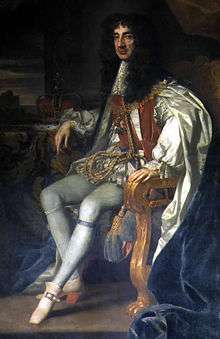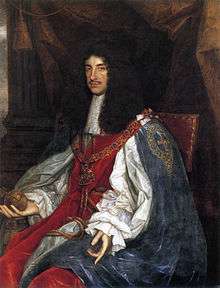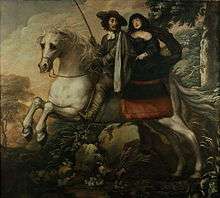
If we are understood, more words are unnecessary; if we are not likely to be understood, they are useless.
King Charles II of England (29 May 1630 – 6 February 1685) was the King of England, Scotland, and Ireland.
Quotes
- Better than a play!
- On the House of Lords' debate on Lord Ross's Divorce Bill (1610), as quoted in King Charles the Second (1931) by Arthur Bryant
- If we are understood, more words are unnecessary; if we are not likely to be understood, they are useless.
- To the Earl of Manchester, as quoted in the notes to Hudibras (1674), Part 1, Canto 1, by Samuel Butler, edited by Henry George Bohn, (1859)
- Let not poor Nelly starve.
- On his deathbed, asking that his favourite mistress, Nell Gwynne, be looked after, as quoted in History of My Own Time (1734), by Gilbert Burnet, Vol.II, Bk.iii, Ch. 17
- Mrs. Lane and I took our journey towards Bristol, resolving to lie at a place called Long Marson, in the vale of Esham.
But we had not gone two hours on our way but the mare I rode on cast a shoe; so we were forced to ride to get another shoe at a scattering village, whose name begins with something like Long—. And as I was holding my horse's foot, I asked the smith what news? He told me that there was no news that he knew of, since the good news of the beating of the rogues the Scots. I asked him whether there was none of the English taken that joined with the Scots? He answered, that he did not hear that that rogue Charles Stewart was taken; but some of the others, he said, were taken, but not Charles Stewart. I told him, that if that rogue were taken he deserved to be hanged, more than all the rest, for bringing in the Scots. Upon which he said, that I spoke like an honest man, and so we parted.- As quoted by Philibert de Gramont (1701), in Memoirs of the Court of Charles the Second (1846) by Anthony Hamilton, edited by Sir Walter Scott.
- He had been, he said, an unconscionable time dying; but he hoped that they would excuse it.
- As quoted in A History of England (1849) by Thomas Babington Macaulay, Vol. I, Ch. 4, p. 437
Quotes about Charles II

There is no king in the world, who can so experimentally testify of God's providence and goodness… ~ Robert Barclay
- Sorted alphabetically by author or source

We have a pretty witty king,
Whose word no man relies on;
He never said a foolish thing,
Nor ever did a wise one. ~ John Wilmot, 2nd Earl of Rochester
Whose word no man relies on;
He never said a foolish thing,
Nor ever did a wise one. ~ John Wilmot, 2nd Earl of Rochester
- A man of words and not of deeds,
Is like a garden full of weeds...- Anonymous (ca. 1680) Puritan satire about Charles II, in a copy of proverbs in the British Museum, as quoted by Percy B. Green, A History of Nursery Rhymes (1899) p. 186.
- There is no king in the world, who can so experimentally testify of God's providence and goodness; neither is there any who rules so many free people, so many true Christians: which thing renders thy government more honorable, thyself more considerable, than the accession of many nations filled with slavish and superstitious souls.
Thou hast tasted of prosperity and adversity; thou knowest what it is to be banished thy native country, to be overruled as well as to rule and sit upon the throne; and being oppressed, thou hast reason to know how hateful the oppressor is both to God and man. If after all these warnings and advertisements thou dost not turn unto the Lord with all thy heart, but forget him who remembered thee in thy distress and give up thyself to follow lust and vanity, surely great will be thy condemnation.
Against which snare, as well as the temptation of those that may or do feed thee and prompt thee to evil, the most excellent and prevalent remedy will be to apply thyself to that Light of Christ, which shineth in thy conscience, which neither can nor will flatter thee nor suffer thee to be at ease in thy sins, but doth and will deal plainly and faithfully with thee as those that are followers thereof have also done.
God Almighty, who hath so signally hitherto visited thee with his love, so touch and reach thy heart, ere the day of thy visitation be expired, that thou mayest effectually turn to him so as to improve thy place and station for his name.- Robert Barclay, in a letter to Charles II (25 November 1675), later published in Theologiæ Vere Christianæ Apologia (1676), and An Apology for the True Christian Divinity: Being an Explanation and Vindication of the Principles and Doctrines of the People called Quakers (1678)
- It is practically impossible to separate the failure of the Restoration Settlements from the personality of King Charles II. In an age of personal monarchy, royal personality mattered. At first, as with nearly all new rulers, only the king's good points shone through. Charles II was highly intelligent. He spoke fluent French and some Italian; he had a particular interest in science, maintaining a laboratory, and serving as the founding patron of the Royal Society. He was also witty, affable, and approachable. (He would, in our own day, have made a terrific TV talk-show host.) This was in sharp, and in the most part, agreeable contrast to his father, who had been impossibly aloof and formal. The new king was also vigorous, as he proved on the tennis court and in the bedroom: in the words of one historian, he was "unmistakably the 'sport' of his line." More importantly, he was tolerant, flexible, and open to compromise- again, in welcome contrast to his father.
- Richard Bucholz and Newton Key, Early Modern England, 1485-1714: A Narrative History (2009), p. 283
- Above all, Charles II saw the need for healing after a quarter-century of bitter conflict. At Breda he had promised forgiveness to his enemies, and, in general, he lived up to that promise: fewer than 40 old rebels and servants of the Commonwealth and Protectorate were left out of the Act of Indemnity and Oblivion (1660). The most serous revenge was reserved for those who had signed Charles I's death warrant and, of these, only 11 were executed. Those unfortunate souls, however, suffered the full fury of the traditional punishments associated with treason: they were hanged, drawn, and quartered, and their boiled remains impaled on the City gates. The new regime even vented its wrath on the dead: the bodies of Oliver Cromwell, Henry Ireton, and John Bradshaw were exhumed and hanged at Tyburn in their shrouds. Afterwards their heads were placed on pikes at Westminster Hall- the place of Charles I's trial- as a warning to all potential rebels.
- Richard Bucholz and Newton Key, Early Modern England, 1485-1714: A Narrative History (2009), p. 283
- On the other hand, Charles II forgave many surviving Roundheads, reappointing them to the offices they had performed so well for the Commonwealth and Protectorate, rewarding them for their new-found loyalty with titles, pensions, and lands. This eased bitterness on their part and it kept experienced and competent people in government. But it also left many old Royalists, impoverished by their long and faithful service to the Stuarts in defeat and exile, resentful that they were not rewarded more generously. In fact, most Royalist nobility and gentry regained the lands lost during the Interregnum, but those further down the social scale were not so lucky. A fund of £60,000 was established for indigent officers, but individual pay-outs were tiny. Hence the dark Royalist joke that the Act of Indemnity and Oblivion meant indemnity for the king's former enemies and oblivion for his friends.
- Richard Bucholz and Newton Key, Early Modern England, 1485-1714: A Narrative History (2009), p. 283-284
- Charles II's willingness to slight old friends for new ones was, in fact, characteristic of the man. A his reign progressed, it became increasingly clear that his loyalty to servants and favorites was undependable; that his intelligence frequently manifested itself as cunning and duplicity; that his charm was often deceptive and self-serving; that his easy-going nature was also lazy and indecisive; and that his flexibility was, in part, the corollary of having no long-term goal or plan. Basically, Charles II was a cynic- and who could blame him? After all, the people who now professed their undying loyalty and affection for him were the very ones who had fought against his father. He would never fully understand their prejudices. On his last visit to his dominions in 1651 he had been forced to hide in a tree before sneaking out of the country in disguise. During the ensuing exile of over eighteen years he had been threatened, denounced, promised to, lied to, used, and spied on by them- as well as by every government in Europe. Often, he would find that a confidential servant was in the pay of his enemies; or that a fellow monarch had used him as a pawn in some diplomatic game of chess with Cromwell. No wonder that he trusted no one. He never knew when the English, Scots, and Irish would change their minds once more and force him to go "on his travels" again.
- Richard Bucholz and Newton Key, Early Modern England, 1485-1714: A Narrative History (2009), p. 284-285
- So, perhaps understandably, the young but wizened king decided to make hay while the sun shone. Hence his laziness. Hence his apparent lack of a long-term plan, besides survival. Hence his almost obsessive interest in "diversion": having fun and relieving boredom through the pursuit and patronage of art, music, literature, the theater, witty conversation, gambling, drinking, and womanizing. A positive result of these tendencies was that the Restoration court was the greatest center for cultural patronage of its day. It has been credited with introducing England to the comedy of intrigue, the first stage actresses, the man's three-piece suit, periwigs, and such delicacies as champagne, tea, and ice cream.
- Richard Bucholz and Newton Key, Early Modern England, 1485-1714: A Narrative History (2009), p. 285
- The King was only fifty-six, and in appearance lively and robust, but his exorbitant pleasures had undermined his constitution. To represent him as a mere voluptuary is to underrate both his character and his intellect. His whole life had been an unceasing struggle. The tragedy he had witnessed and endured in his youth, the adventures and privations of his manhood, the twenty-five years of baffling politics through which he maintained himself upon the throne, the hateful subjugations forced upon him by the Popish Plot, now in his last few years gave place to a serene experience. All the fires of England burned low, but there was a genial glow from the embers at which the wearing King warmed his hands. Halifax, now more than ever trusted, still urged him to the adventure of a new Parliament, and Charles might have consented, when suddenly in February 1685 an apoplectic stroke laid him low. The doctors of the day inflicted their tormenting remedies upon him in vain. With that air of superiority to death for which all mortals should be grateful he apologised for being "so unconscionable a time in dying." James was at hand to save his soul. Old Father Huddleston, the priest who had helped him in the days of the Boscobel oak, was brought up the backstairs to rally him to Rome and give the last sacrament. Apart from hereditary monarchy, there was not much in which Charles believed in this world or another. He wanted to be King, as was his right, and have a pleasant life. He was cynical rather than cruel, and indifferent rather than intolerant. His care for the Royal Navy is his chief claim upon the gratitude of his countrymen.
- Winston Churchill, A History of the English-Speaking Peoples, Volume Two: The New World (1956), p. 381-382
- Richmond, Grafton, St. Albans, Buccleuch,
Southampton, Daventry, Montagu —
These peers' families' fathers are reckoned —
Merrily back to King Charles the Second.- Iain Moncreiffe and Don Pottinger, quoted in Blood Royal (1956)
- If his Majesty is resolved to have my head, he may make a whistle of my arse if he pleases.
- Algernon Sydney, on being told that part of his sentence had been remitted — that he would merely be executed, but his estate would remain intact, quoted in Joe Miller's Jests (1739), p. 6
- The Quakers suffered several persecutions under Charles II; not upon a religious account, but for refusing to pay the tithes, for "theeing" and "thouing" the magistrates, and for refusing to take the oaths enacted by the laws.
At length Robert Barclay, a native of Scotland, presented to the king, in 1675, his "Apology for the Quakers"; a work as well drawn up as the subject could possibly admit. The dedication to Charles II., instead of being filled with mean, flattering encomiums, abounds with bold truths and the wisest counsels. "Thou hast tasted," says he to the king, at the close of his "Epistle Dedicatory," "of prosperity and adversity: thou hast been driven out of the country over which thou now reignest, and from the throne on which thou sittest: thou hast groaned beneath the yoke of oppression; therefore hast thou reason to know how hateful the oppressor is both to God and man. If, after all these warnings and advertisements, thou dost not turn unto the Lord, with all thy heart; but forget Him who remembered thee in thy distress, and give thyself up to follow lust and vanity, surely great will be thy guilt, and bitter thy condemnation. Instead of listening to the flatterers about thee, hearken only to the voice that is within thee, which never flatters. I am thy faithful friend and servant, Robert Barclay."
The most surprising circumstance is that this letter, though written by an obscure person, was so happy in its effect as to put a stop to the persecution.- Voltaire, in "The History of the Quakers" in The Works of Voltaire (1762), Vol 13, as translated by Tobias George Smollett, Thomas Francklin, et al., later published as "The Religion of the Quakers", in The Works of Voltaire: A Contemporary Version with Notes (1901), Vol. 33, as modernized by William F. Fleming
- We have a pretty witty king,
Whose word no man relies on;
He never said a foolish thing,
Nor ever did a wise one.- John Wilmot, 2nd Earl of Rochester, as quoted in Blackwood's Edinburgh Magazine Vol. XLIV (January - June 1857) p. 592; It is said to that this was written on the door of Charles II's bedchamber, and that on seeing it, the king replied, "This is very true: for my words are my own, and my actions are my ministers'...."
External links
This article is issued from
Wikiquote.
The text is licensed under Creative
Commons - Attribution - Sharealike.
Additional terms may apply for the media files.

